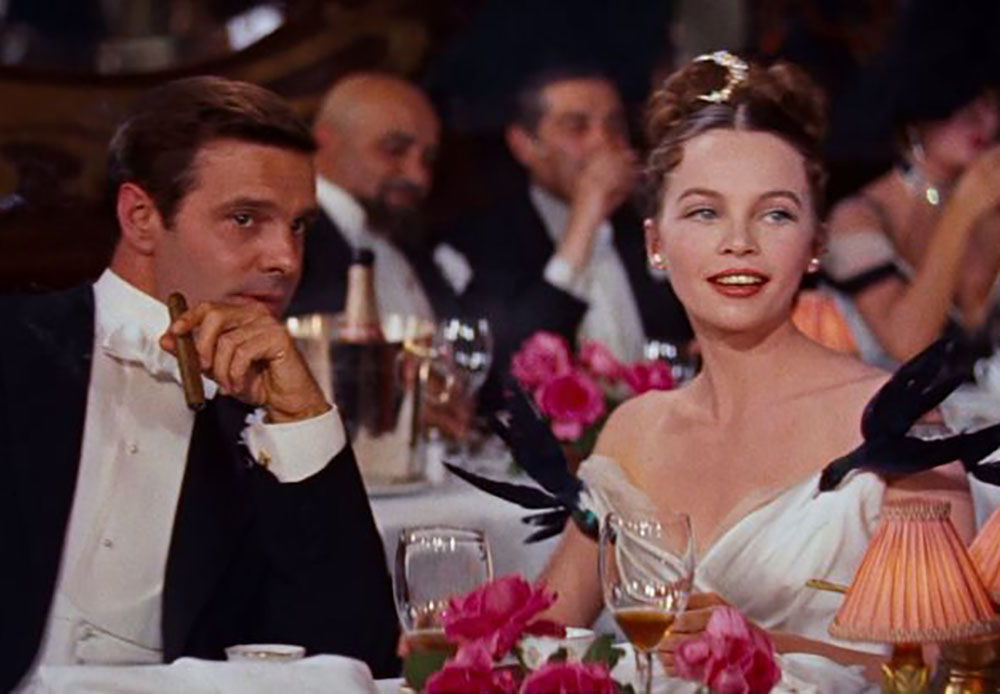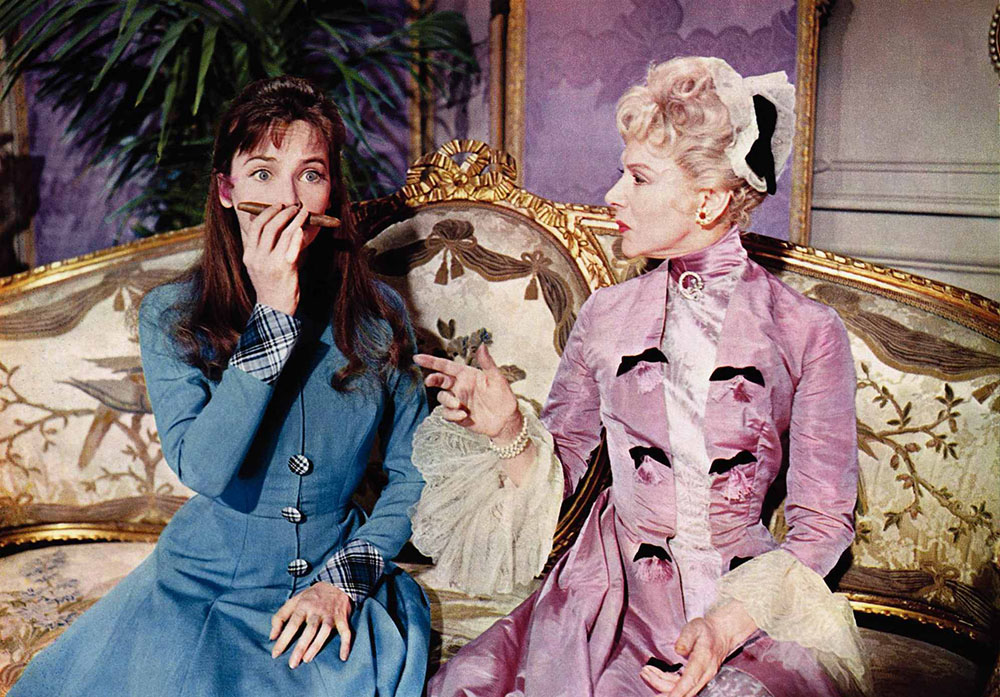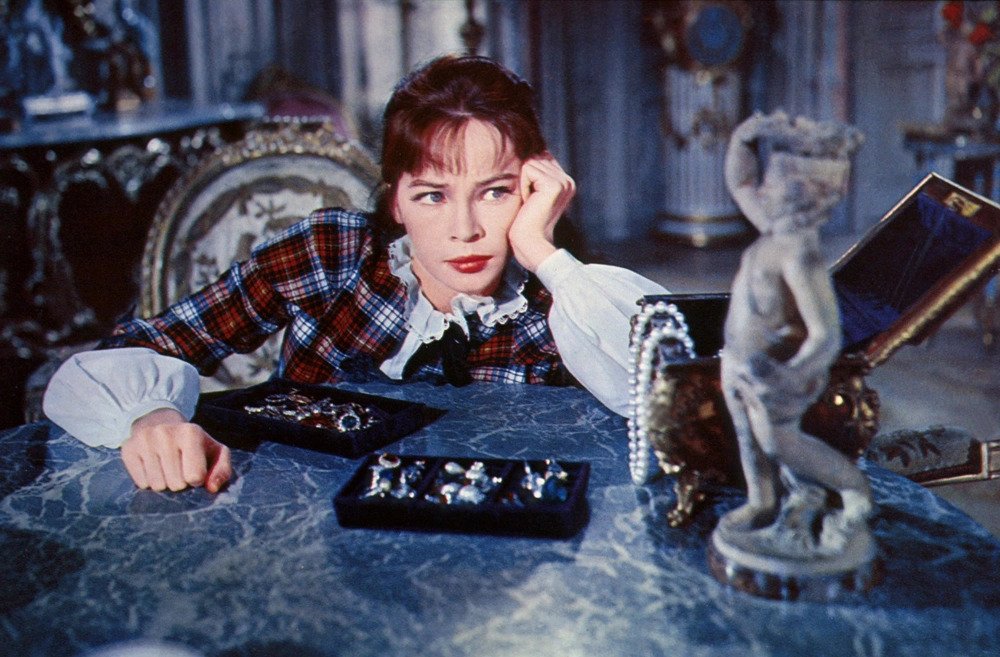The film’s critical and commercial success paved the way for “West Side Story” (1961) and “My Fair Lady” (1964); these were both crowd-pleasing technical achievements which are by now cultural touchstones. “Gigi” was billed and succeeded as a light and fanciful musical about love and longing. And while it is about those things, audiences, critics, and the Academy chose to ignore the story’s darker sides. With Minnelli at the helm, “Gigi” could have been a truly shocking and subversive film, instead of a gleeful, formulaic studio musical.
Enigmatic Characters and Troubling Themes Hiding Under ‘Gigi’s’ Veneer
At first glance, “Gigi” looks like a bright, fluffy romantic musical shot in gay Paris. Look closer. From the start, the film delivers enigmatic characters and troubling themes. There’s Honore Lachaille (Maurice Chevalier), who opens and closes the film singing “Thank Heaven for Little Girls.” His nephew Gaston (Louis Jordan) is a handsome and jaded playboy who pushes an ex-lover to suicide as revenge for betraying him. Gigi (Leslie Caron) is Gaston’s eventual love interest; and while the age gap between the two is never specified in the film, in Colette’s novella “Gigi” is fifteen and Gaston is her much-older uncle.
…the film opens and closes with an ode to little girls, and its two lead male characters cheer to an ex’s suicide.”
Honore Lachaille is the first character we meet, and the last one we see before the end credits. In each of those scenes, he’s seated in a park, statuesque, surrounded by little girls. His eyes occasionally dart towards the children, but his attention is mostly forward, including viewers as collaborators in this tribute. Lachaille croons longingly (“Those little eyes/So helpless and appealing”), directing his gaze away from the audience. He eventually points out a playful group which includes Gigi and some of her schoolmates.
Threats and Payback Hidden Amongst a Cheery Musical
Lachaille is Gaston’s mentor, advising him mostly on matters related to his pursuit of women. And when Gaston suspects and confirms that his current lover (Eva Gabor) is cheating on him, mentor and mentee concoct an inane plan to exact revenge. The two amateur sleuths find out where she will be, spy on her, and confront the man she’s dining with. There’s a veiled threat and promise to the man that if he just leaves, he’ll get off easily. Innocent enough. The real payback, it turns out, is the ex-lover’s suicide; it’s revaled in the next scene, in which Gaston and Lachaille commemorate that victory with a toast.

Meanwhile, Gigi the ingenue is learning how to be a woman. Her aunt teaches her how to eat pheasant in a scene that is handled with the kind of innocent charm that made Caron (at 27 years old) perfect for this role. In her best moments, Caron’s Gigi resembles a G-rated Sally Bowles; she’s a vulnerable, impressionable rebel who seems at pains to remind us of her need for independence but also, acceptance. Caron commands the screen in all of her scenes; her performance has far more authenticity than Natalie Wood’s Maria (“West Side Story”) and just as much charisma as Audrey Hepburn’s Eliza Doolittle (“My Fair Lady”).
Caron is Grand; Minnelli Handles the Film’s More Provocative Elements Lightly
So, the film opens and closes with an ode to little girls, and its two lead male characters cheer to an ex’s suicide. Minnelli is presenting all of this lightly, with a hearty dose of humor. Lachaille isn’t a creep, he’s just a sentimental, elegiac old man. His other big song, “I’m Glad I’m Not Young Anymore,” tells us as much (“The rivals that don’t exist at all/The feeling you’re only two feet tall/I’m glad I’m not young anymore.”). Gaston isn’t predatory or vindictive, he’s just a handsome young man playing the field. Besides, his ex-lover was past the age of consent, so he deserved someone younger. There are weighty themes and character traits that deserve more than just a passing glance. To long for this in a sixty-three year old studio romp might seem unreasonable, had somebody other than Minnelli directed it.
Minnelli directed forty films in a career that spanned four decades.”
Prolific in output yet meticulous in detail, Minnelli directed forty films in a career that spanned four decades. His best films, especially the underrated “Two Weeks in Another Town” (1962) were highly-personal and unapologetically provocative; they often mined taboo topics such as depression and sexuality. In “Two Weeks,” Kirk Douglas is fresh out of a mental health clinic and called on to finish directing a movie that his role model/possible former lover Edward G. Robinson can’t finish. Robinson, supposedly an ally, knows he’s setting Douglas up for failure; the film charts his descent from triumphant comeback to mental and physical breakdown. It’s a juicy and cynical melodrama that functions as a pseudo-sequel to Minnelli’s own “The Bad and the Beautiful” (1952), in which Douglas plays a tyrannical, win-at-all-costs film producer.

Minnelli Didn’t Always Woo Audiences with his Scathing Hollywood Admonishments
Both of those Minnelli films were scathing in their portrayal of the Hollywood studio system in which everyone’s a phony and there’s no such thing as a happy ending. At his best, Minnelli evoked artistic torment and personal obsession more effectively than any director of that era. He was a closeted gay man, married (to Judy Garland) with a child (Liza Minnelli), working in an industry that didn’t exactly reward daring personal projects. A movie like “Two Weeks” flopped at the Box Office in part because the public wasn’t always ready for Minnelli’s brand of intensity.
It’s impossible to know what exactly Minnelli hoped to accomplish with “Gigi.” It was, however, a success by any measurable standard. The New York Times’ Bosley Crowther labeled it “charming entertainment,” while repeatedly comparing it to “My Fair Lady’s” stage version. Publications ranging from the iconoclastic Village Voice to that Hollywood mainstay Variety were almost unconditionally positive on the film. In 1991, the National Film Preservation Board added “Gigi” to its National Film Registry, deeming it “culturally, historically, or aesthetically significant.” “Gigi,” according to the Registry’s mission, is a film that reflects “who we are as a people and as a nation.”
With ‘Gigi,’ the Public Got the Movie from Minnelli it Wanted
The public got the movie that it wanted back then; and as “Gigi” has aged, it has retained its relevance more for what the film doesn’t do. It deviates from Colette’s novella and is faithful instead to Alan Jay Lerner’s songbook. In doing so, Minnelli lightens the blow, expecting us to sit erect alongside Lachaille as he obsesses over his little girls. And we should chuckle along with Gaston and Lachaille when they hoist glasses to commemorate a woman killing herself. The least of all offenses, relatively speaking, is that Gigi is given less screen time than a movie with her name in the title might imply. Anyway, she ends up with the man of her family’s dreams, so all’s well that ends well.

Measured by that slippery platitude, the film succeeded, too. “Gigi” won more Oscars than any film that preceded it, providing a template for the next round of flaccid stage-to-film adaptations. In Minnelli’s hands, however, “Gigi” almost became an uncomfortable provocation. It is more than just lush, technicolor entertainment with a standard romantic arc and boy-gets-girl denouement.
The film’s shockingly casual attitude towards its characters’ unforgivable perversions does its best to let the audience off the hook. But that ends up implicating the viewers, challenging assumptions about our collective attitudes, and what we avoid seeing and hearing. As Pauline Kael said, a good movie should not make you feel virtuous. But “Gigi” lets us down by singing and dancing around the darker edges of human nature, continually redirecting our attention to something funny and colorful. Look closely, not away; this is a movie that might actually tell us who we are as a nation, and as a people.
You can watch “Gigi” currently on HBO Max, VUDU, Prime Video, Redbox. or Vudu Movie & TV Store on your Roku device.
Support the Site: Consider becoming a sponsor to unlock exclusive, member-only content and help support The Movie Buff!

